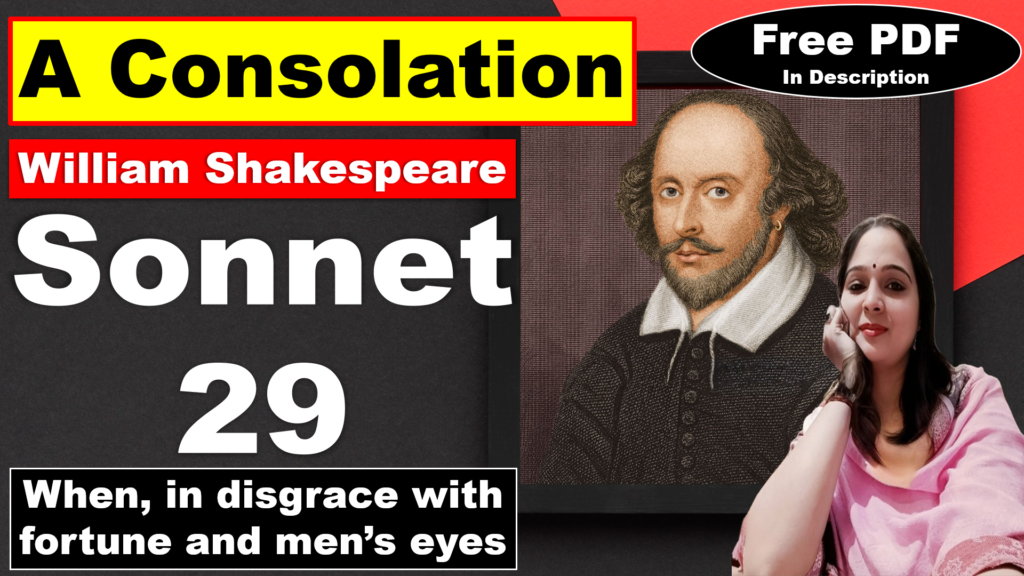
Sonnet 29 by Willian Shakespeare | A Consolation | William Shakespeare | Explanation | Summary | Key Points | Word Meaning | Questions Answers | Critical Appreciation | Free PDF Download – Easy Literary Lessons
Sonnet 29
When, in disgrace with fortune and men’s eyes
When, in disgrace with fortune and men’s eyes,
I all alone beweep my outcast state,
And trouble deaf heaven with my bootless cries,
And look upon myself and curse my fate,
Wishing me like to one more rich in hope,
Featured like him, like him with friends possessed,
Desiring this man’s art and that man’s scope,
With what I most enjoy contented least;
Yet in these thoughts myself almost despising,
Haply I think on thee, and then my state,
(Like to the lark at break of day arising
From sullen earth) sings hymns at heaven’s gate;
For thy sweet love remembered such wealth brings
That then I scorn to change my state with kings.
Sonnet 29 by Willian Shakespeare: YouTube Link
Sonnet 29 by Willian Shakespeare Analysis
Line 1: When, in disgrace with fortune and men’s eyes,
Explanation: The opening line sets the stage for the speaker’s emotional state. The speaker feels disgraced and ostracized, both in terms of his material well-being and his social standing.
Line 2: I all alone beweep my outcast state,
Explanation: The speaker expresses his profound loneliness and despair, lamenting his outcast state.
Line 3: And trouble deaf heaven with my bootless cries,
Explanation: The speaker’s cries for help go unanswered, as he feels unheard and ignored by the heavens.
Line 4: And look upon myself and curse my fate,
Explanation: The speaker’s self-reflection leads to a sense of self-loathing and bitterness, as he curses his fate.
Line 5: Wishing me like to one more rich in hope,
Explanation: The speaker envies those who possess a greater sense of hope and optimism, longing for a similar outlook.
Line 6: Featured like him, like him with friends possessed,
Explanation: The speaker admires those who are successful and have a strong support system, wishing he could emulate their achievements and relationships.
Line 7: Desiring this man’s art and that man’s scope,
Explanation: The speaker expresses his desire to possess the talents and abilities of others, feeling inadequate in comparison.
Line 8: With what I most enjoy contented least;
Explanation: The speaker finds himself dissatisfied with the things he already has, despite previously enjoying them.
Line 9: Yet in these thoughts myself almost despising,
Explanation: The speaker’s negative thoughts and self-loathing have reached a point where he almost despises himself.
Line 10: Haply I think on thee, and then my state,
Explanation: A ray of hope emerges when the speaker thinks of his loved one.
Line 11: Like to the lark at break of day arising
Explanation: The speaker compares his transformation to the lark’s cheerful song at dawn.
Line 12: From sullen earth sings hymns at heaven’s gate;
Explanation: The speaker’s newfound positivity is so overwhelming that he can sing hymns of gratitude to heaven.
Line 13: For thy sweet love remembered such wealth brings
Explanation: The speaker’s love for his loved one is the source of his newfound wealth and happiness.
Line 14: That then I scorn to change my state with kings.
Explanation: The speaker’s love is so precious that he would not even exchange his state with that of a king.





